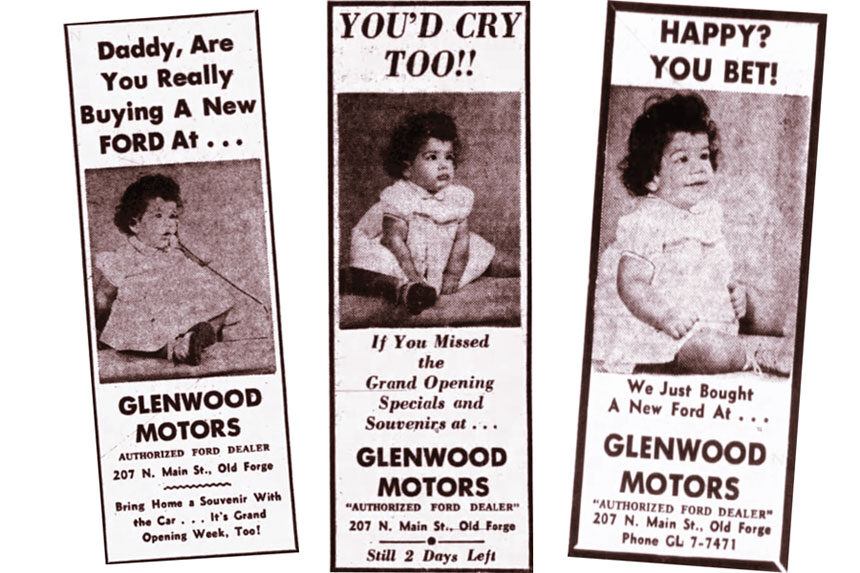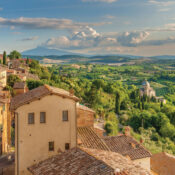A memory: my junior year at Penn. I go home for Christmas. I bring the first story I wrote for the professor who, upon reading it, told me I would and should be a writer. (We can curse her later.) My mother is in the kitchen. My dad is in his favorite spot, The Recliner. Oh, this was such a nifty recliner! They got it at the fanciest furniture store in Scranton. It was from The Recliner that my dad did his favorite things: watch Johnny Carson; hold forth with all the relatives, friends, and friends of his kids who always seemed to be in the house; and fall asleep, snoring loudly, even if (especially if) the house was full of company.
But on this night, it’s just the three of us. I hand a copy of my first “story” to each parent. My mother, Josephine, is mortified, horrified. I have made fun of our parish priest. She expresses her displeasure without uttering a word, by banging pots and pans. I look at my father, in The Recliner. He’s flipping through the pages and laughing. As robustly as he can without Josie hearing him. Then he looks at me. And grins. And puts a finger to his mouth, as if to say, “This is between us.” Then he utters the words that every daughter needs to hear from her father: “This is great.”
My daddy sold Fords. It’s hard to put too fine a point on how his profession defined him. And, in many ways, me. I should probably start with “the Glenwood Baby.” I was around four or five — probably four, because they sent me to kindergarten a year early (read into that what you will) — when I started to notice that strangers on the street would say to my mother, “Is that the Glenwood Baby?” What were they talking about?
Soon I would learn the whole story. My dad opened his gleaming, sprawling car dealership in 1961, the year I was born. It was a big deal. His father, Pietro, an immigrant from Napoli, sold fruits and vegetables out of a truck on Lackawanna Avenue. This was during the Depression and the war. It is safe to say Dad “came from nothing,” but then, so did everyone in 1940s immigrant-rich Scranton. He clearly came from something extraordinary. So much that he ended up first in his class at Scranton Central High. Then he served in the war, in the Navy. Then, through the G.I. Bill, he got a degree in accounting at the University of Scranton, and got a job as the accountant for a local car dealership. He started to think he should open his own, and somehow wrangled the substantial loan he needed. And so it was that Glenwood Ford had its grand opening in 1961.
My dad always had a keen instinct for marketing, and he knew he had to do something more than just put the usual pedestrian car ads in the Scranton Times. And, well, there was this chubby, precocious baby right there in front of him! My mother dressed me in frilly dresses that she sewed herself, my father took the snapshots (having me hold a phone on a cord to my ear), and the Glenwood Baby was born. “Do you want a great deal on a new car? Call the Glenwood Baby!” the ads proclaimed.
It worked. I was the face that launched a thousand Mustangs. (I’m still waiting for royalties.)
Now, please don’t misinterpret this. Though I was the Glenwood Baby (have I mentioned I was the Glenwood Baby?), my dad was rarely effusive in his praise to me. He was of that generation of Italians, particularly Italian men, who didn’t emote in an “I love you” kind of way. You had to figure it out. And it took me a while.
Fast-forward to age 11 or 12. My father was always at “the place,” as my mother called the car dealership. (“Where’s Dad?” “He’s at the place.” “Is Dad coming home for dinner?” “He’s at the place.”) And somehow it was decided that on Saturdays, I could go with my dad to the place. This was exhilarating to me! I was the third of four kids, but only I got those special days with Dad. We would drive to Glenwood Ford around eight in the morning — and when I say drive, I mean the way my dad always drove (fast, tailgating, taking corners on two wheels, always knowing the shortcuts; God, I loved how he drove). We didn’t talk much on those drives. As I said, there wasn’t a lot of emoting.
He gave me a job. I got to sit with his secretaries, Marilyn and Patti, who were saints, really, putting up with this kid, the daughter of the boss. And I got to answer the phones and direct the calls over the intercom that could be heard all over the dealership, indoors and out: “Service, line one!” “Joe DePaulo, line two!” I thought this was the coolest thing in the world.
My dad paid me 40 cents an hour and never gave me a raise. Or as I like to put it: Thanks, Dad, for preparing me for a life in journalism.
Age 15. My career at Glenwood Ford comes to a crashing halt. My father’s top salesman, a hottie by the name of Jimmy Granahan, takes me out on his motorcycle. Well. I remember Jimmy, with my arms wrapped around him, pulling back up to the place. My dad was in front of the huge glass doors to the showroom, pacing, with steam blowing out of his ears. It did not end well. For me, anyway. Jimmy kept his job. He was, after all, the top salesman.
My dad had a 1927 Model T, a beauty. He kept it in the middle of the showroom. It had GLENWOOD FORD blazoned on the sides. As a kid, I used to love to sit behind the wheel (in the showroom) and beep the horn: AR-U-GA! Then, when I become a teenager, my father starts taking me to Sherwood Park, a few blocks from our house in Dunmore, in the Model T and letting me drive it! It was a park; it wasn’t like roads or anything, or traffic. It was also our little secret.
At 15 and a half, I get my driver’s permit. Back then, you could drive at age 16 and got your permit six months earlier. The day the permit arrives, both my parents take me out for “the first time” to teach me how to drive. Dad is riding shotgun in the front seat next to me; Mom is in the back. We actually get on the highway right away. It’s going swell. Until a not-happy voice from the backseat: “She drove before!” Who, me? My dad looks at me with that whisper thing he’d have later in The Recliner. Then says to my mother, “Nah, she’s just a natural.”
My 16th birthday. He gives me a vintage Ford Thunderbird. Circa early ’60s. Oh, man. It was gorgeous. Sort of an ice blue, and the dashboard looked like an airplane. I was a junior in high school, and suffice it to say, I was suddenly very popular. My friends and I did everything, and I mean everything, in the Thunderbird. Or to put it another way: She had fun, fun, fun till her daddy took the T-bird away.
I was 30 when he died. It was sudden. Aneurysm. Sixty-four years old. Boom. No warning. Except that there was a “mild heart attack,” as they called it in Scranton, five months before. (Memo to self: Do not have your “mild heart attack” in Scranton.) And as though he knew maybe it wasn’t so mild, we had our first and only heart-to-heart at that time. He emoted, for a brief moment, from his hospital bed, after he had what was described as routine angioplasty. I remember he wanted “a good cup of coffee,” so I ran out and got him one from Dunkin’ Donuts, which he loved. It never occurred to me that I should have gotten decaf. The bells on his monitors started to go off. When it all quieted down, he told me a few things: that I had a great life and a great career, and that I shouldn’t be so worried about finding a guy unless that guy made my life better. Then the bells went off again.
Five months later. There is a line, wrapping a good two blocks, around the Vito Rinaldi funeral home in Dunmore. This is not a surprise. My dad was the guy who always picked up the check. And, sometimes, the check at the next table. (To this day, I cannot stomach a cheap guy.) What I didn’t know until he was lying in a casket was how many cars and other gifts he quietly gave away. Is it okay to say that I never really knew my dad until he died? Scratch that. I never really knew what I meant to him until he died. I remember standing in the receiving line.
“Are you Lisa? He was so proud of you.” “Are you Lisa? He talked about you all the time.” This went on and on. For hours.
I remember looking at my daddy in the casket and thinking: “You mean this guy?”
A few days after his funeral, one of my brothers, my mother, and I went to the Elmhurst Country Club to collect the belongings from his golf locker. In the bottom of his locker, he had a pile of papers a good six inches high. They were Xeroxes of stories I wrote for Philadelphia magazine. “He used to hand them out to us on the golf course,” one of his golf buddies told me in the receiving line. I had no clue.
I had no clue about the most important thing: My dad, he really got me.
Lisa DePaulo is an award-winning feature writer whose articles have appeared in The New York Times, Elle, New York Magazine, Vanity Fair, GQ, and Philadelphia, among others.
This article is featured in the May/June 2023 issue of The Saturday Evening Post. Subscribe to the magazine for more art, inspiring stories, fiction, humor, and features from our archives.
Become a Saturday Evening Post member and enjoy unlimited access. Subscribe now




Comments
It’s true, we learn a lot about our parents after they are gone. I realized what a hard life my mom had; however, she absolutely made the best of the hand she was dealt. I wish I would have realized this while growing up, especially being the bratty teenager I was. Sometimes I really want to go back in time, and give my mom all the support & care she truly needed. So sorry mom, I knew I loved you, but it wasn’t until I came home to spend those last two years & two months before we lost you that I realized how deeply I loved you & respected you for carrying on your burden with such grace & unselfishness.
What a wonderfully written, heartwarming personal essay, Lisa! There’s nothing like a cute baby to get people into a particular (in this case Glenwood Ford) dealership over a competitors. I like how you told your Dad’s story of being an Italian-American immigrant and how hard he worked to get to that grand opening day in 1961.
The cars themselves. I have to touch on that. The ’63 Galaxie was particularly beautiful and rocket ship-like. The mid-size Fairlane, the Falcon. My mom had a ’61 Falcon station wagon for years! The 3rd generation ’61-’63 T-Bird with the jet-style taillights. The special ‘roadster’ (’62-’63) convertible with the tonneau covering of the rear seats, making it a two-seater. The first ever Mustangs!
An early 60’s T-Bird in the late ’70s was quite the 16th birthday present. Blue ice color with that jet plane dashboard. It was around that time my Mom rented a manual Pinto for me to learn how to drive stick, and I wound up stripping the gears.
She got the car back to Avis with me, and (in tears) told the man at the counter she didn’t mean for it to happen. He simply and quickly gave her her money back. Impossible to even IMAGINE today. Never! Once back at the car though, I was scolded for making her lie as she did the sign of the cross, and was told not a word to my Dad.
I like how your Dad kept that ’27 Model T on the showroom floor, and eventually let you drive it a little. He was really proud of you, keeping Xeroxes of your stories in his golf locker to hand out to his buddies. I’m sorry you lost him at only age 64.
I also didn’t know about the generous things my Dad (an attorney) had done for his clients until after he passed away, and all the nice things he’d say about me, by quite a few people. It was surreal and very touching. I wasn’t even sure he even liked me that much truthfully; hate to say it. Thank you very much for sharing your story.